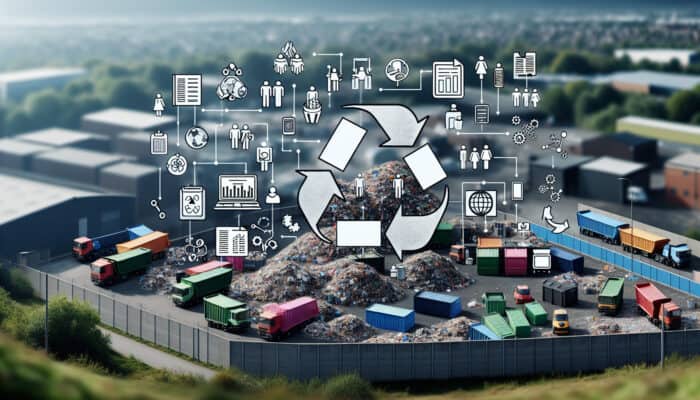Overview of Landfill Waste in UK Clearances
Current State of Landfill Waste

Reducing Landfill Waste in UK Clearances: The United Kingdom is facing a significant challenge with landfill waste, generating millions of tonnes annually. In 2021 alone, the UK produced approximately 222.6 million tonnes of waste, with a notable portion stemming from clearance operations. These operations, whether residential, commercial, or construction-related, contribute heavily to landfill volumes. Understanding this dynamic is crucial to addressing the waste crisis. Reports indicate that around 48% of municipal waste is sent to landfill, highlighting the urgency for effective waste management strategies.
The recycling rates have improved, reaching around 44.7% in England; however, it is still evident that a substantial gap remains to be bridged. Many households and businesses remain unaware of efficient waste management practices, which exacerbates the issue. The need for increased awareness and actionable strategies for reducing landfill contributions becomes paramount.
Types of Waste in Clearances
Clearance waste can be diverse, encompassing several categories that require tailored management approaches. The primary types include household waste, commercial waste, and construction debris. Household waste typically consists of general rubbish, food waste, and recyclable materials. Commercial waste often includes packaging, office materials, and electronic waste, while construction debris may contain bricks, concrete, and hazardous materials.
Understanding these categories is fundamental for effective recycling and waste reduction strategies. For instance, household waste can often be diverted to composting or recycling, while construction waste can benefit from deconstruction practices that allow for material reuse. By identifying the types of waste generated, stakeholders can implement targeted interventions to address specific waste streams.
Environmental Impact of Landfill Waste
The environmental repercussions of landfill waste in the UK are profound, contributing to pollution, greenhouse gas emissions, and a decline in biodiversity. Landfill sites are notorious for emitting methane, a potent greenhouse gas that significantly impacts climate change. Furthermore, toxic leachate from landfills can contaminate soil and water sources, posing risks to local ecosystems and public health.
The biodiversity loss associated with landfill expansion is also alarming. Natural habitats are encroached upon as landfills grow, leading to a decline in local flora and fauna. This not only disrupts ecosystems but also diminishes the benefits they provide, such as clean air and water. The urgency to combat these environmental impacts is evident, necessitating a collective effort to reduce landfill contributions through improved waste management practices.
Government Policies and Regulations on Landfill Waste

The UK government has implemented various policies and regulations to manage landfill waste effectively. The Waste and Resources Strategy for England outlines ambitious targets for reducing waste and increasing recycling rates. Additionally, the Landfill Tax, introduced in 1996, serves as a financial deterrent against landfill use, encouraging businesses to adopt more sustainable waste management practices.
Current legislation, such as the Environment Act 2021, reinforces the commitment to reducing waste and promoting a circular economy. These frameworks aim to shift the focus from disposal to prevention, mandating that businesses develop waste prevention plans. While progress has been made, ongoing evaluations are necessary to ensure these policies effectively address the challenges of landfill waste in clearance operations.
Expert Insights on Reducing Landfill Waste in UK Clearances
Include real-world examples of successful waste reduction.
Several UK businesses and communities have made significant strides in reducing landfill waste through innovative practices. For example, a community initiative in Bristol has successfully transformed local waste management by implementing comprehensive recycling and composting programs, resulting in a 30% reduction in landfill waste. Similarly, a construction firm in London adopted a deconstruction approach, salvaging materials from demolished buildings, which not only reduced landfill contributions but also saved costs on new materials.
Key practices employed by these successful entities include:
- Implementing comprehensive recycling schemes that cater to all waste types
- Engaging with local councils to enhance community awareness
- Using digital platforms to track and manage waste
- Encouraging businesses to adopt circular economy principles
These examples illustrate the tangible impact of focused efforts on waste reduction, showcasing that collaborative community actions can yield significant environmental benefits.
What Are the Challenges in Implementing Waste Reduction?

Implementing waste reduction strategies in the UK faces several challenges, including logistical, financial, and regulatory hurdles. Many businesses, especially small to medium-sized enterprises (SMEs), struggle with the costs associated with transitioning to sustainable practices. The lack of financial incentives for waste reduction can deter companies from investing in necessary infrastructure.
Logistically, the UK’s existing waste management systems may not be equipped to handle the complexities of modern waste streams. Many local authorities face capacity constraints, resulting in inefficiencies in waste collection and processing. Regulatory challenges also arise, as businesses may find compliance with multiple regulations overwhelming, particularly when operating across different regions.
These challenges underscore the need for a more supportive framework that addresses both financial and logistical barriers to implementing effective waste reduction strategies in clearance operations.
Provide actionable steps for businesses and households.
Reducing landfill waste is achievable for both businesses and households in the UK through practical, actionable steps. Businesses can start by conducting waste audits to identify areas for improvement, adopting waste minimisation techniques, and engaging employees in sustainability initiatives. Households can implement home recycling systems, composting organic waste, and reducing single-use plastics.
Actionable steps include:
- Conducting regular waste audits to identify improvement areas
- Implementing clear recycling guidelines for all employees
- Reducing packaging waste by choosing bulk purchasing options
- Engaging in community recycling programs and initiatives
By adopting these strategies, both businesses and households can play a vital role in reducing landfill waste and fostering a more sustainable future.
How Does Waste Segregation Help in UK Clearances?
Benefits of Segregating Waste at Source
Segregating waste at the source is a critical step in minimising landfill contributions during clearance operations in the UK. When waste is sorted into categories—recyclables, compostable materials, and general waste—it significantly enhances recycling rates and reduces contamination. This practice not only simplifies the recycling process but also ensures that more materials are diverted from landfills.
The benefits of waste segregation at source include improved recycling rates, reduced disposal costs, and enhanced sustainability practices. By ensuring that recyclables are not mixed with general waste, communities can maximise their recycling potential. This leads to a decrease in the volume of waste sent to landfill, thus mitigating environmental impacts. Moreover, engaging the public in waste management efforts cultivates a culture of responsibility and awareness.
What Are the Best Practices for Waste Segregation?
Effective waste segregation requires specific strategies and tools tailored for UK clearance operations. Best practices include providing clearly labelled bins for different waste types, educating individuals on proper segregation methods, and conducting regular training sessions for staff involved in waste management.
Establishing a consistent colour-coded bin system can simplify the segregation process. For example, green bins for compostable waste, blue for recyclables, and black for general waste can facilitate an intuitive approach. Furthermore, signage that clearly indicates what can and cannot be placed in each bin is essential for reducing contamination rates.
Engaging community members through workshops and informational campaigns can also enhance participation and compliance with waste segregation practices. This proactive approach not only improves waste management outcomes but also fosters a sense of community responsibility towards sustainable practices.
Role of Technology in Waste Segregation
Technology plays a pivotal role in enhancing waste segregation efforts across the UK. The introduction of smart bins equipped with sensors enables real-time monitoring of waste levels, facilitating more efficient collection strategies. Furthermore, mobile applications that educate users on local recycling guidelines and provide updates on collection times can empower residents to participate actively in waste reduction.
Additionally, AI-driven sorting technologies in recycling facilities can significantly improve the accuracy and efficiency of waste segregation. These systems can quickly identify and separate materials, reducing contamination and ensuring that more recyclables are processed effectively. The integration of technology into waste management operations not only streamlines processes but also fosters greater community engagement in recycling initiatives.
Research-Backed Benefits of Reducing Landfill Waste in UK Clearances
Economic Advantages of Waste Reduction
Reducing landfill waste presents substantial economic advantages for businesses and local authorities across the UK. By minimising waste generation, companies can significantly lower disposal costs, as landfill fees can be exorbitant. Moreover, adopting sustainable practices can lead to new revenue streams through recycling and the sale of reclaimed materials.
Research indicates that businesses that engage in effective waste management practices often experience enhanced operational efficiency and cost savings. For instance, a study revealed that firms implementing waste reduction strategies reported savings of up to 20% on waste disposal costs. Additionally, government incentives for sustainable practices can further bolster financial benefits, making waste reduction an economically viable choice for businesses.
Environmental Benefits of Waste Reduction
Decreasing landfill waste offers numerous environmental benefits that positively impact local ecosystems and communities. By diverting waste from landfills, the UK can significantly reduce greenhouse gas emissions, particularly methane released during decomposition. Furthermore, less reliance on landfills helps preserve natural habitats and biodiversity, which are crucial for maintaining ecological balance.
Investing in waste reduction has also been shown to improve air and water quality, as reduced landfill usage leads to less pollution. Enhanced recycling and composting efforts contribute to the conservation of resources and energy, further amplifying the positive environmental outcomes associated with waste reduction initiatives. These benefits underscore the vital role of sustainable waste management in combating climate change and promoting environmental stewardship.
What Are the Social Benefits of Reducing Landfill Waste?
Reducing landfill waste has a positive impact on community health and quality of life. Improved waste management practices can lead to cleaner neighbourhoods, reducing the prevalence of litter and associated health hazards. Furthermore, communities that actively engage in waste reduction initiatives often see enhanced social cohesion, as residents come together to address shared environmental challenges.
Studies have shown that communities with robust waste management programs report higher levels of community well-being and satisfaction. Local initiatives promoting recycling and composting can also provide educational opportunities, fostering a culture of sustainability among residents. By prioritising waste reduction, communities can not only improve local aesthetics and health outcomes but also instil a sense of pride and responsibility among residents.
Policy and Regulatory Impacts of Waste Reduction
The impact of reducing landfill waste extends to shaping policy and regulatory frameworks in the UK. As communities adopt more sustainable practices, there is a growing demand for policies that support and incentivise waste reduction. This shift is evident in recent legislative developments aimed at promoting circular economy principles.
The UK government’s commitment to ambitious recycling targets is reshaping waste management strategies, encouraging businesses and individuals to prioritise waste reduction. As policy frameworks evolve, they create an environment that fosters sustainable practices, promoting innovation and collaboration across sectors. These changes underscore the interconnectedness of waste reduction efforts and regulatory advancements, highlighting the importance of a cohesive approach to tackling landfill waste.
Trusted Strategies for Reducing Landfill Waste in UK Clearances
Offer expert analysis on policy and regulation.
An in-depth analysis of UK policies and regulations reveals both strengths and weaknesses in supporting waste reduction. The Waste and Resources Strategy, for instance, sets ambitious targets for recycling and waste reduction but may lack robust enforcement mechanisms. This gap highlights the need for greater accountability and support for local authorities in implementing these strategies effectively.
Moreover, while the Landfill Tax has proven effective in discouraging landfill use, there is an ongoing debate regarding its adequacy in incentivising substantial behaviour change among businesses. Future policy iterations should consider providing additional financial incentives to businesses that demonstrate significant reductions in waste generation and promote a culture of sustainability.
Strengthening collaborative efforts between government agencies, businesses, and communities is crucial to enhancing the effectiveness of waste reduction initiatives. By fostering dialogue and sharing best practices, stakeholders can develop more comprehensive policies that address the complexities of waste management in the UK.
Community Engagement in Waste Reduction
Community involvement is integral to the success of waste reduction initiatives in the UK. Engaging residents in local recycling programs and sustainability campaigns fosters a sense of ownership and responsibility towards waste management. Successful initiatives, such as community clean-up events and recycling competitions, have demonstrated how grassroots efforts can lead to significant increases in recycling rates and decreases in landfill waste.
Collaboration with local schools and organisations can further enhance community engagement, providing educational opportunities that empower residents to take action. Initiatives that promote waste reduction, such as workshops on composting and recycling, not only raise awareness but also equip individuals with practical skills for sustainable living.
Encouraging community dialogues around waste management challenges can also yield innovative solutions tailored to local contexts. By fostering a culture of collaboration, communities can drive meaningful change in waste reduction efforts and create lasting impacts on the environment.
What Role Does Education Play in Waste Reduction?
Education is a fundamental pillar in changing waste management behaviours in the UK. By raising awareness about the environmental impacts of landfill waste and the importance of sustainable practices, educational programmes can empower individuals and communities to make informed decisions regarding waste.
Schools play a pivotal role in instilling sustainable values in young people by integrating waste reduction and recycling into their curricula. Initiatives such as school garden projects and recycling clubs not only teach practical skills but also promote a sense of responsibility towards the environment.
In addition to formal education, public awareness campaigns can effectively reach diverse audiences, utilising social media and community events to disseminate information about waste management practices. By equipping individuals with knowledge and resources, educational initiatives can catalyse behavioural changes that lead to reduced landfill waste and a more sustainable future.
Future Trends in Reducing Landfill Waste in UK Clearances
Innovations in Waste Management
As the UK navigates its waste management challenges, innovations are emerging that promise to revolutionise the way waste is handled. Advances in recycling technology, including enhanced sorting systems and the development of biodegradable materials, are paving the way for more efficient waste processing. Furthermore, the rise of apps that track waste disposal and recycling habits empowers individuals to engage more actively in sustainable practices.
The development of waste-to-energy technologies is also gaining traction, providing an alternative to landfill disposal by converting waste into renewable energy. Such innovations not only help in managing waste but also contribute to reducing reliance on fossil fuels, aligning with broader environmental goals.
Moreover, collaborative initiatives between businesses, NGOs, and local authorities are fostering innovation in waste reduction strategies. By sharing best practices and resources, stakeholders can collectively address waste management challenges and develop effective and sustainable solutions.
How Will Policy Evolve to Support Waste Reduction?
Future policy developments in the UK are likely to focus on promoting a circular economy and fostering sustainable practices across various sectors. Anticipated changes may include enhanced regulations on single-use plastics, incentivising businesses to adopt sustainable packaging, and increasing transparency around waste management practices.
Policies promoting producer responsibility will also likely gain momentum, holding manufacturers accountable for the lifecycle of their products and encouraging them to design for recyclability. Transitioning towards a circular economy requires a paradigm shift in policy frameworks, prioritising waste reduction and resource efficiency at all levels.
Collaboration between government bodies, industries, and communities will be essential in shaping these policy changes. By engaging stakeholders in the policy-making process, a more inclusive approach can be developed, ensuring that regulations effectively address the complexities of waste management.
The Role of Circular Economy in Waste Reduction
The circular economy model presents a transformative approach to waste management in the UK, offering a significant pathway to reduce landfill waste. By prioritising resource efficiency, this model encourages the reuse and recycling of materials, shifting away from the traditional linear approach of “take, make, dispose.”
Implementing circular economy principles can lead to a more sustainable economy, reducing the demand for virgin materials and minimising waste generation. Businesses adopting circular practices often experience enhanced brand loyalty and cost savings through reduced resource consumption.
Encouraging collaboration between businesses, consumers, and policymakers is crucial in advancing the circular economy. By fostering partnerships that support sustainable practices, the UK can work towards a future where waste is viewed as a resource rather than a burden.
Community Engagement in Waste Reduction Strategies
Looking ahead, community engagement will continue to play a vital role in enhancing waste reduction efforts across the UK. Innovative initiatives that involve residents in decision-making processes can foster a sense of ownership and responsibility towards local waste management practices.
Future trends may include the expansion of community-led recycling programmes, engaging local artists and educators to raise awareness and drive participation. Additionally, leveraging digital platforms for community engagement can facilitate collaboration and information sharing among residents.
By empowering communities to take an active role in waste management, the UK can cultivate a culture of sustainability that transcends individual behaviours, leading to lasting change in reducing landfill waste.
FAQs
What are the main types of waste generated in UK clearances?
The primary types of waste generated in UK clearances include household waste, commercial waste, and construction debris, each requiring tailored management strategies.
How much landfill waste does the UK produce annually?
The UK produces approximately 222.6 million tonnes of waste annually, with a significant portion contributed by clearance operations.
What are some successful examples of waste reduction in the UK?
Successful examples include community initiatives in Bristol that significantly reduced landfill waste through comprehensive recycling programmes.
What challenges do businesses face in reducing landfill waste?
Businesses often face logistical, financial, and regulatory challenges when implementing waste reduction strategies, particularly small to medium-sized enterprises.
How can households effectively reduce landfill waste?
Households can reduce landfill waste by implementing home recycling systems, composting, and minimising single-use plastics.
What are the benefits of waste segregation at the source?
Waste segregation at the source improves recycling rates, reduces disposal costs, and enhances community responsibility towards waste management.
How does technology assist in waste segregation?
Technology aids waste segregation through smart bins that monitor waste levels and AI-driven sorting systems that enhance recycling efficiency.
What economic benefits arise from reducing landfill waste?
Reducing landfill waste leads to cost savings on disposal, new revenue streams from recycling, and increased operational efficiency for businesses.
What social advantages does reducing landfill waste provide?
Reducing landfill waste leads to cleaner communities, improved public health, and greater community cohesion through shared sustainability efforts.
How is the UK government supporting waste reduction policies?
The UK government supports waste reduction through legislation such as the Waste and Resources Strategy and the Landfill Tax, promoting sustainable practices.






